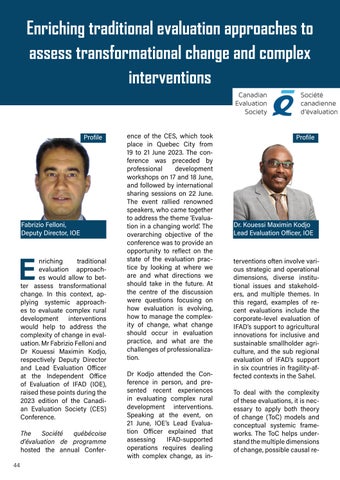Enriching traditional evaluation approaches to assess transformational change and complex interventions Profile
Fabrizio Felloni, Deputy Director, IOE
E
nriching traditional evaluation approaches would allow to better assess transformational change. In this context, applying systemic approaches to evaluate complex rural development interventions would help to address the complexity of change in evaluation. Mr Fabrizio Felloni and Dr Kouessi Maximin Kodjo, respectively Deputy Director and Lead Evaluation Officer at the Independent Office of Evaluation of IFAD (IOE), raised these points during the 2023 edition of the Canadian Evaluation Society (CES) Conference. The Société québécoise d’évaluation de programme hosted the annual Confer-
44
ence of the CES, which took place in Quebec City from 19 to 21 June 2023. The conference was preceded by professional development workshops on 17 and 18 June, and followed by international sharing sessions on 22 June. The event rallied renowned speakers, who came together to address the theme ‘Evaluation in a changing world’. The overarching objective of the conference was to provide an opportunity to reflect on the state of the evaluation practice by looking at where we are and what directions we should take in the future. At the centre of the discussion were questions focusing on how evaluation is evolving, how to manage the complexity of change, what change should occur in evaluation practice, and what are the challenges of professionalization. Dr Kodjo attended the Conference in person, and presented recent experiences in evaluating complex rural development interventions. Speaking at the event, on 21 June, IOE’s Lead Evaluation Officer explained that assessing IFAD-supported operations requires dealing with complex change, as in-
Profile
Dr. Kouessi Maximin Kodjo Lead Evaluation Officer, IOE
terventions often involve various strategic and operational dimensions, diverse institutional issues and stakeholders, and multiple themes. In this regard, examples of recent evaluations include the corporate-level evaluation of IFAD’s support to agricultural innovations for inclusive and sustainable smallholder agriculture, and the sub regional evaluation of IFAD’s support in six countries in fragility-affected contexts in the Sahel. To deal with the complexity of these evaluations, it is necessary to apply both theory of change (ToC) models and conceptual systemic frameworks. The ToC helps understand the multiple dimensions of change, possible causal re-
















